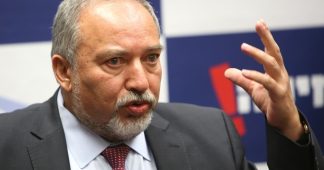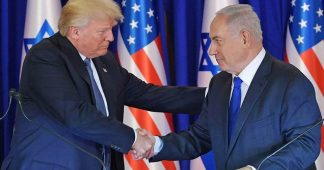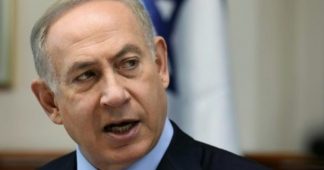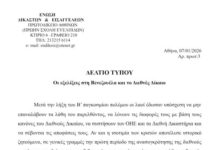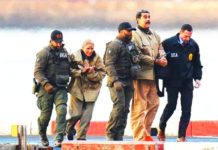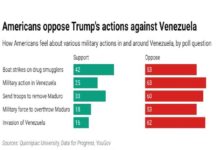Two weeks ago the prime minister looked set to lose power, and now he has thwarted his opponents. But the recrimination is yet to come
Lily Galili
21 May 2021
Contrary to what some sceptics insinuate, operation “Guardians of the Walls” (aka war in Gaza) was quite successful.
Not for the walls of homes in Israel, and certainly not in Gaza, for that matter. They were barely guarded at all. But the walls of “Balfour”, as Israelis refer to the prime minister’s official residence in Jerusalem, have certainly been reinforced and secured.
At least, temporarily. The government “of change”, which appeared on the verge of ousting Benjamin Netanyahu, is instead out of the running itself.
The strange creation, which attempted to bring together far-right Israelis and Palestinian citizens of Israel, was one of the immediate victims of this war.
For many, the prospective anti-Netanyahu government was not “collateral damage” – it was carefully targeted for elimination by the prime minister.
“The timing of the operation is far from accidental,” Major General Yair Golan, an MP in the left-wing opposition Meretz party and retired deputy chief of the general staff of the Israeli military, tells Middle East Eye. “It came to serve Netanyahu’s political and legal needs. The escalation would not have happened otherwise. Netanyahu is a sophisticated politician. It is not that he pre-planned the operation; he just knew exactly what buttons to push to make it happen. We are dealing with a pyromaniac ready to do everything to stay in power.”
At the other end of the political spectrum, but also part of the same anti-Netanyahu camp, head of Yisrael Beiteinu party Avigdor Lieberman does not mince his words.
“Netanyahu collaborates with Hamas; they share the same interest. Machiavelli could take private lessons from Netanyahu,” the former defence minister and erstwhile loyal ally of Netanyahu, told Channel 12.
A different political context
It is not the first time an Israeli politician is accused of using force with a political motivation. Yet, it is the first time in Israel that such accusations have been so widespread and so vocal with violence ongoing. They are usually reserved for the day after. Not now.
What makes this different is the political context of the 11-day operation. Netanyahu is the head of a transition government with no legitimate parliamentary backing. Just weeks ago, having dragged Israel to four rounds of elections in two years, he failed to form a new government.
He was then obliged to hand the mandate to form a government over to Yair Lapid, head of the centrist Yesh Atid party, who was about to form an implausible coalition of the left and right.
Netanyahu spent weeks trying, to no avail, to politically sabotage that attempt. Having exhausted all the tricks in the book, many felt he was about to do “something”, and many suspected that “something” had to do with real or imaginary security threats, so easily manipulated.
The writing was on the wall, written in Hebrew and Arabic. One of those writing in English was New York Times columnist Thomas Friedman, who knows Israel well, and wrote: “I warned that Netanyahu – who is desperate to stay in power and avoid possibly going to prison if convicted in his corruption trial – was not above inflaming the situation so much that his right-wing rivals have to abandon trying to topple him and declare instead that this is no time for a change in leadership.”
Friedman is no prophet; he simply knows Netanyahu. And his column was quoted widely in the Israeli media.
Netanyahu, on the other hand, knows the Israeli-Palestinian conflict and its sensitivities. He knew the sensitivity of the timing: the holy month of Ramadan. He knew the sensitivity of al-Aqsa Mosque during this time. And he knew also that tensions were sky high in Sheikh Jarrah, where 40 Palestinian families were threatened with expulsion in the lead-up to the commemoration of Nakba Day on 15 May. Yet he allowed the use of brutal police force in both locations, knowing from experience how it might play out. And it did.
He also knew Hamas’ modus operandi. Netanyahu first came to power in 1996 on the back of a wave of Hamas suicide bombings, and they have catered to each other’s political needs since.
“Hamas and Bibi don’t talk. They don’t need to,” writes Friedman. “They understand what the other needs to stay in power and consciously or unconsciously behave in ways to ensure that they deliver it.”
An ’embarrassing’ ceasefire
It took just a few days of domestic riots, rockets fired on Israel and bombs destroying Gaza once again for Netanyahu’s clear and present danger to be at least postponed.
Both Naftali Bennett, head of the far right Yamina party and the man likely to replace Netanyahu as premier, and Mansour Abbas, leader of the Islamist Raam party, realised the new socio-political circumstances made their nascent coalition an impossibility. Both abandoned the government of change, thus allowing Netanyahu extra time to make a political move to stay in power. That is all Netanyahu needed at this point.
The Gaza war bought him a much-needed asset: time.
But Netanyahu needs more to stay in power. The prime minister did not emerge from this operation with a much-coveted image of victory. As soon as a ceasefire kicked in at 2am on Friday, all political hell broke loose.
Gideon Saar, head of the New Hope party and member of the anti-Netanyahu bloc, issued supportive statements during the operation. As soon as a ceasefire was announced, he tweeted: “All Netanyahu got from Hamas is unconditional ceasefire. Embarrassing.”
On Friday morning, the far-right MP Itamar Ben Gvir, who was instrumental in instigating recent domestic race riots, warned his Jewish Power party would not join Netanyahu’s coalition if Jews were not allowed to pray in al-Aqsa Mosque, the holy site known to Jews as the Temple Mount.
This is not an empty threat. This is the party that prevented the formation of Netanyahu’s government before the military operation and now holds even more power to do so. Two hours later, a senior source from Netanyahu’s Likud party told MEE: “The Temple Mount will soon reopen.”
He insisted that it has nothing to do with Ben Gvir’s threat. It does.
That afternoon, Israeli police stormed al-Aqsa once again, shooting tear gas, stun grenades and rubbed-tipped bullets at worshippers after Friday prayers: exactly the provocation that started the Gaza war in the first place.
Rocky road ahead
This is just a small illustration of what lies ahead.
Netanyahu killed the option of an alternative government, but he still does not have one of his own. He will try to market the operation as his immense personal triumph, while opposition voices muted by red alerts will make an overt attempt to reveal the futility of it all.
Likud’s imposed silence projects embarrassment. Most of the immediate harsh criticism comes from politicians to Netanyahu’s right. Still, his even bigger problem is the way the operation is perceived by the Israeli public and residents of the south, many of them his loyal voters.
In a poll published just hours before the ceasefire, 72 percent of people in the south and 68 percent of all Israelis were for a prolonged operation. These are the people Netanyahu will have to win over – again – if Israel goes to a fifth round of elections.
6 October is a striking date for Israel. It’s the date the 1973 war erupted, and when Egypt’s Anwar Sadat was assassinated. If Netanyahu fails to form a government, that is most likely the day Israelis will be asked to vote once again.
He certainly keeps trying, even under fire. In between throwing bombs and dealing with barrages of rockets, Netanyahu’s closest circle was busy flying experimental balloons: another rotation government with Benny Gantz, perhaps, or one with Saar. Though both are fierce Netanyahu critics, the underlying assumption was that the critical situation and successful military operation might make it an offer that’s hard to refuse.
It seems much less realistic at this point. Lapid still keeps the mandate to form a coalition for another two weeks, and rebuffs all insinuations that Bennett might be looking for a way to re-join the anti-Netanyahu bloc.
This is what Netanyahu wanted in the first place. Though expert in taking all credit and dodging bullets, he will have to deal now with the political and social ruins of his “Guardians of Balfour’s Walls” operation.
Published at www.middleeasteye.net

